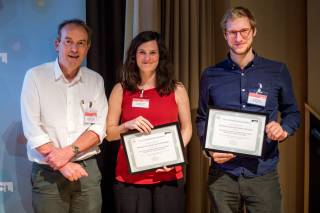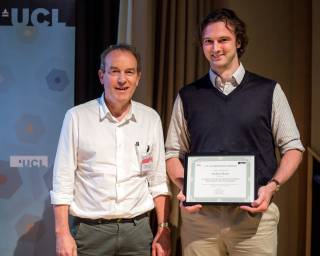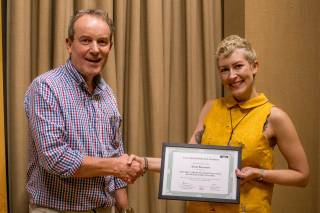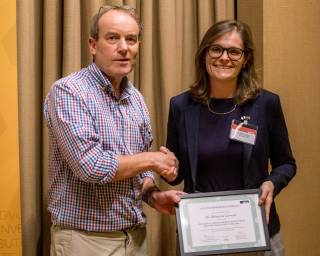Submissions for the Early Career Neuroscience Prize 2024 are now open!
Background
Each year the UCL Neuroscience Domain presents the Early Career Neuroscience Prize to two UCL neuroscientists. The prize aims to recognise outstanding work published in the past year by early career UCL neuroscientists in any field of neuroscience, and is awarded in two categories; junior scientist and advanced scientist.
Submissions should be sent via email to Gurjit Matharu.
Eligibility
The competition is open to all UCL PhD students, postdoctoral fellows, research associates and junior Principal Investigators (first position as PI, lecturer, or research fellow and within 10 years of receipt of a PhD or MD) working on any aspect of neuroscience.
Nominees are expected to have led a ground-breaking piece of work, which they have published (online or in print) as first author or corresponding author in a peer-reviewed journal between 1 August 2023 and 3 April 2024. The research should have been conducted at UCL. (Papers accepted/ in press before deadline of 3 April will also be eligible for inclusion if accompanied by confirmation of acceptance from the Journal).
Winners receive a prize of £750 and are given the opportunity to present their work at the annual Neuroscience Symposium on Thursday 20 June 2024.
Assessment criteria
Nominations will be judged by an internal expert panel according to the following criteria:
- Creativity, originality and potential impact of the research
- Nominee’s involvement in that paper
Nominations
Nominations will be assessed in two groups. Two prizes will be awarded and both winners will be asked to present their work at the symposium:
- PhD student – Junior postdoc (up to 3 years post-PhD)
- Senior Postdoc (+3 years post-PhD) – Junior PI (within 5 years of starting your Lab)
Candidates should self-nominate. Nominations must include the following documentation:
- A supporting statement from the nominee, providing a brief summary of the research (in language accessible to a broad range of neuroscientists), the significance of the work and potential impact on its field together with a description of the nominee’s involvement (must not exceed one page of A4/500 words). Nominees should also indicate which of the two groups above they fall into.
- The publication to be considered in pdf format
- A list of up to 5 of your own relevant publications that support the nomination
- Confirmation of impending publication by the Journal (only applicable if article accepted but not yet published)
- A talk title for your presentation (in the event you are successful and are chosen to present)
- A biography (maximum 100 words) and photo (high resolution) to be included in the event programme if you win
Winners must be prepared to give a 15-minute presentation of their work at the annual Neuroscience Symposium on Thursday 20 June 2024. Only one application per individual is allowed.
Deadlines and apply
The deadline for submission of nominations is Monday 29 April 2024, 13:00.
Submissions should be sent via email to Gurjit Matharu. Please state if your submission is for the Junior or Advanced category.
2023 Early Career Neuroscience Prize winners
Advanced Category: Asaph Zylbertal, Senior Research Fellow, Department of Neuroscience, Physiology & Pharmacology, UCL
Recurrent network interactions explain tectal response variability and experience-dependent behaviour
Junior Category: Tom George, PhD Student, Sainsbury Wellcome Centre, UCL
From theory to mechanism: how the hippocampus learns predictive maps
- 2022 Early Career Neuroscience Prize winners
Junior Category: Candela Sánchez Bellot, Andrew MacAskill Lab, UCL Department of Neuroscience, Physiology and Pharmacology
Winning Paper: Two opposing hippocampus to prefrontal cortex pathways for the control of approach and avoidance behaviourAdvanced Category: Stéphane Bugeon, Cortexlab, UCL Queen Square Institute of Neurology
Winning Paper: A transcriptomic axis predicts state modulation of cortical interneurons- 2021 Early Career Neuroscience Prize winners
Junior Category: Federico Rossi, UCL Institute of Ophthalmology
Winning Paper: Spatial connectivity matches direction selectivity in visual cortexAdvanced Category: Ian Harrison, UCL Centre for Advanced Biomedical Imaging
Winning Paper: Impaired glymphatic function and clearance of tau in an Alzheimer’s disease model: A novel therapeutic target for tauopathies?- 2020 Early Career Neuroscience Prize winners
Junior Category: Yunzhe Liu, Max Planck UCL Centre for Computational Psychiatry and Ageing Research
Winning Paper: Human replay spontaneously reorganizes experience. Yunzhe Liu, Raymond J. Dolan, Zeb Kurth-Nelson, and Timothy E.J. Behrens. Cell (2019); 178(3): 640–652Advanced Category: Dr Dimitar Kostadinov, Wolfson Institute for Biomedical Research, UCL
Winning Paper: Predictive and reactive reward signals conveyed by climbing fiber inputs to cerebellar Purkinje cells. Dimitar Kostadinov, Maxime Beau, Marta Blanco-Pozo, and Michael Häusser. Nature Neuroscience (2019), 22: 950-962- 2019 Early Career Neuroscience Prize winners
Junior Category: Dominic Evans and Vanessa Stempel, UCL Sainsbury Wellcome Centre
Winning Paper: A synaptic threshold mechanism for computing escape decisions. Evans DA, Stempel AV, Vale R, Ruehle S, Lefler Y, Branco T. Nature. 2018 Jun; 558(7711):590-594Advanced Category: Nathan Skene, UCL Institute of Neurology
Winning Paper: Genetic identification of brain cell types underlying schizophrenia. Skene NG, Bryois J, Bakken TE, Breen G, Crowley JJ, Gaspar HA, Giusti-Rodriguez P, Hodge RD, Miller JA, Muñoz-Manchado AB, O’Donovan MC, Owen MJ, Pardiñas AF, Ryge J, Walters JTR, Linnarsson S, Lein ES; Major Depressive Disorder Working Group of the Psychiatric Genomics Consortium, Sullivan PF, Hjerling-Leffler J. Nature Genetics. 2018 Jun; 50(6):825-833

Dominic Evans and Vanessa Stempel, the 2019 Junior Prize Winners receive their certificates from Professor Trevor Smart, UCL Neuroscience Domain Chair. Nathan Skene, the 2019 Advanced Prize Winner receives his certificate from Professor Trevor Smart, UCL Neuroscience Domain Chair. - 2018 Early Career Neuroscience Prize winners
Junior Category: Anna Krasnow, UCL Department of Neuroscience, Physiology and Pharmacology
Winning Paper: Regulation of developing myelin sheath elongation by oligodendrocyte calcium transients in vivo. Krasnow AM, Ford MC, Valdivia LE, Wilson SW, Atwell D. Nature Neuroscience. 2018 Jan; 21(1):24-28
Advanced Category: Dr Rebecca Lawson, UCL Wellcome Trust Centre for Neuroimaging
Winning Paper: Adults with autism overestimate the volatility of the sensory environment. Lawson RP, Mathys C, Rees G. Nature Neuroscience. 2017 Sept; 20(9): 1293-1299

Anna Krasnow, the 2018 Junior Prize Winner receives her certificate from Professor Trevor Smart, UCL Neuroscience Domain Chair. Dr Rebecca Lawson, the 2018 Advanced Prize Winners receives her certificate from Professor Trevor Smart, UCL Neuroscience Domain Chair.
 Close
Close

